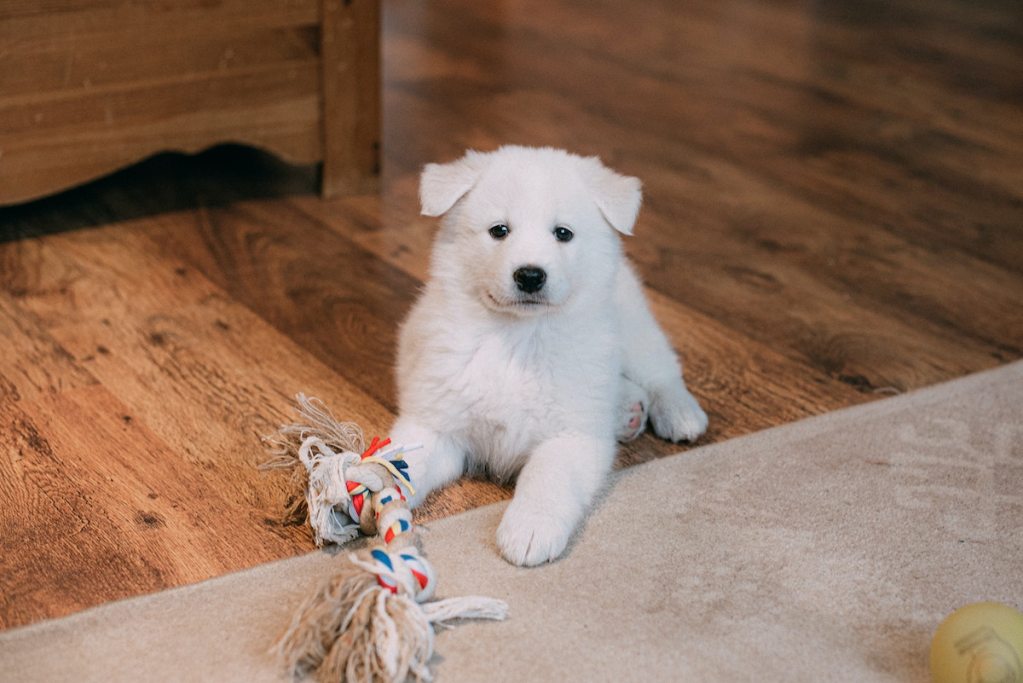
Dog behavior typically runs the gamut from quirky to cute. While it’s perfectly normal for your pooch to tremble with excitement at mealtime or during a romp through the park, it’s concerning if your dog suddenly begins shaking and acting strangely at the same time. If you’ve ever frantically searched phrases like “my dog is shaking and acting weird” with the hope of finding answers, we’re here to help.
We’ll walk you through some of the most common reasons why your precious pup may be shaking and acting peculiar. However, even if you think the reason for your dog’s unusual behavior is completely benign, we still recommend a trip to the vet to make sure everything is okay. It’s always better to be safe than sorry when your pet’s health is concerned.

6 possible reasons your dog is shaking and acting weird
Every dog parent has witnessed their pup shake with excitement. But when trembling is accompanied by strange behavior, it could be a sign of a problem. Here are some of the most common reasons dogs shake and behave oddly.
#1: Your dog is in heat
If you have an unspayed female, your dog will go into a period of fertility known colloquially as “heat” twice a year. According to the National Canine Research Association of America (NCRAOA), female dogs in heat “will often exhibit erratic behavior, such as shaking, frequent urination, and general anxiety.” Additional symptoms of heat include a swollen vulva, vaginal bleeding, and increased friendliness toward male dogs. There’s an easy fix if her estrus cycle is responsible for your dog’s shaking and unusual behavior: Have her spayed. While the procedure is quite common, your pup has a slightly elevated risk of bleeding during surgery because estrus increases blood flow.
#2: Your dog has anxiety
Just like humans, dogs can suffer from mental issues like stress and anxiety. If your dog begins shaking and behaving strangely during a thunderstorm or a fireworks display, it’s likely he suffers from anxiety. Speak to him in a calm tone of voice, move him to a quiet room as far away from the source of noise as possible, and speak to your vet about the possibility of medication that can help calm your dog during times of stress.
#3: Your dog has Cushing’s disease
Cushing’s disease, also called hypercortisolism, primarily affects middle-aged and senior dogs and can become serious if left untreated. When your dog’s adrenal glands create too much cortisol (a stress hormone), it can lead to side effects like lethargy, trembling, incontinence, plaques on the skin known as calcinosis cutis, increased hunger and thirst, panting, and hair loss. Only your veterinarian can diagnose Cushing’s disease, so you should take your pup in if you suspect he’s ill.
#4: Your dog has heat exhaustion
While it may sound odd, dogs often shiver when they’re suffering from heat exhaustion. In addition to shaking and behaving unusually, your dog will most likely pant excessively. Unlike humans, dogs don’t release their body heat by sweating. Instead, they pant to cool themselves off. If heat exhaustion is left untreated, your dog may suffer serious health consequences. In extreme cases, it can be fatal, so you should take your pooch to the vet right away if you think he’s suffering from heat exhaustion.
#5: Your dog has been poisoned
Erratic behavior, vomiting, pale gums, and shaking are all signs that indicate your dog may have ingested something toxic. Household cleaning products, chemicals like antifreeze, rat and insect poisons, chocolate, grapes, and the sugar substitute xylitol are all common culprits of poisoning. Take your dog to the vet immediately if you suspect he’s eaten something toxic.
#6: Your dog has distemper
Thanks to readily available distemper vaccinations, this virus is most common in puppies and young, unvaccinated dogs. Unusual behavior, discharge from the eyes and nose, fever, shaking, diarrhea, vomiting, and coughing are all symptoms of distemper. The American Veterinary Medical Association (AVMA) says, “Distemper is often fatal, and dogs that survive usually have permanent, irreparable nervous system damage.” There is no cure for distemper, but your pup will receive supportive care if he’s diagnosed. If you believe your dog is suffering from distemper, you should contact your veterinarian without hesitation.

Harmless reasons your dog is shaking
While the aforementioned causes of shaking are alarming, remaining calm is of the utmost importance. If your dog’s behavior is caused by anxiety, he may be more likely to continue trembling if he thinks you’re upset with him. Remember that dogs don’t understand why their human family members are panicked, and an already frightened pup will be more inclined to react fearfully to your behavior.
Seeing your dog in distress is frightening, but his shaking might not be anything to worry about. Some dogs tremble because they’re excited to see you. If you’ve recently come home from work or a night out, your pup’s shaking should resolve shortly. Senior dogs, puppies, and small breeds get cold easier than other dogs. It’s also possible that your pooch is shaking because he’s trying to tell you it’s chilly inside.

Always consult your vet
If you notice your dog shaking and acting weird, you’ll want to assess the situation quickly and calmly. Are there any loud noises in the area that may be disturbing your pooch? Has he been outside in the heat for too long? Does your dog suffer from any health conditions that may be causing his shaking and unusual behavior? If possible, film your dog’s behavior for a minute. The footage may help your veterinarian properly diagnose your pup. If you notice any additional symptoms, contact your vet to let him know you’re on the way. Even if your dog quickly returns to normal, it’s still worth touching base with the vet. There’s no such thing as being too careful with your fur baby’s health.



